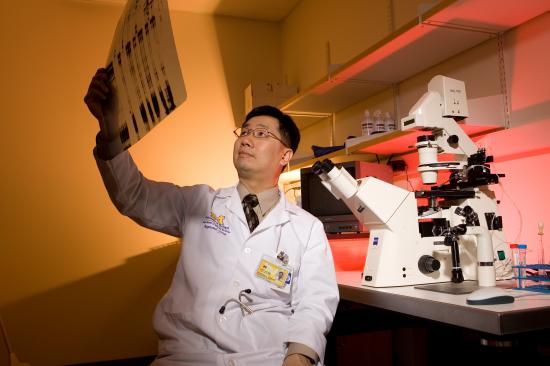The Michigan Medicine Geriatrics Center and Institute of Gerontology receive more grant support from the National Institute on Aging than any other institution in the country. Drawing on the strength and breadth of our faculty expertise, the Geriatrics Center and Institute of Gerontology support research in a broad range of areas related to aging. Research is being conducted across many disciplines in basic biomedical science, translational and clinical research, behavior and social studies, and health services delivery.
These investigations share a common goal of enhancing the independence of older adults by improving the understanding of the aging process and related health outcomes. To this end, research programs at the Geriatrics Center and Institute of Gerontology focus on key programmatic areas.
Research Areas
Biogerontology
Basic research studies are conducted at the cellular and molecular level by a team of approximately 70 faculty members, technicians, postdoctoral fellows, and graduate and undergraduate students. Their work examines the effects of aging on cell function, molecular pathways, and late-life diseases in human and animal model systems.
Biomechanics and Mobility
The Biomechanics Research Laboratory and Mobility Research Center study performance, mobility assessment, bladder and pelvic muscle coordination, and other aspects of biomechanical and musculoskeletal function, and provide quantitative biomechanical assessment to define positive outcomes in quantitative terms.
Aging Populations
A large body of work is being conducted by Institute of Gerontology faculty to better understand the risk factors and outcomes of diseases and conditions that affect older adults. Data from large population-based studies (such as the NIA-funded Health and Retirement Study and administrative datasets (such as Medicare and Medicaid) are being used for these studies.
The goal of these studies is to identify factors that might reduce the risk for chronic diseases and geriatric conditions in older adults, and improve the delivery, affordability, and quality of long-term care in both home-based and institutional settings. Researchers are working to assess care delivery in older populations to develop model approaches for delivering the most cost-effective care to the growing number of older adults.
Clinical and Translational Research
Translational research links basic and clinical investigations on aging and common health problems of older adults. Faculty are engaged in laboratory and clinical studies of a number of aging related diseases such as type 2 diabetes mellitus, hypertension, congestive heart failure, arthritis, depression, Alzheimer’s disease, and other neurologic disorders. Research is also being conducted on a variety of age-related conditions including frailty, infections, and multiple chronic conditions to develop new approaches and therapies for treatment.
Institute of Gerontology
In 1965, the State of Michigan took a landmark step in advancing gerontology as a field of inquiry in the United States by creating the nation's first state-funded center on aging at the University of Michigan. The Institute of Gerontology (IoG) grew into a premier center for aging research and remains at the forefront of the field.
Today, the Institute of Gerontology, led by Raymond Yung, MB, ChB, is one of the oldest and most highly regarded academic programs of its kind. Operating as the research arm of the U-M Geriatrics Center, the IoG is a major resource in studying the aging process and is home to world-class faculty.
Because of the interdisciplinary and multidisciplinary research of the IoG, faculty members are drawn from many areas throughout the University and the Medical School. In addition to IoG core faculty, many associated faculty participate as members of the IoG, conducting cutting-edge research to advance the field of aging.
The IoG and the University of Michigan continue to lead the way in attracting and maintaining federal research dollars. The IoG has a remarkably broad range of intellectual interests, is home to two National Institutes of Aging-funded center grants, and its faculty's research productivity is second to none. In the future, as in the past, innovation will be the benchmark of the University of Michigan record in gerontology.



